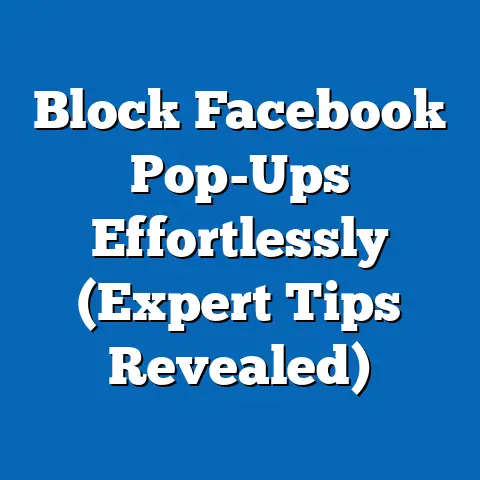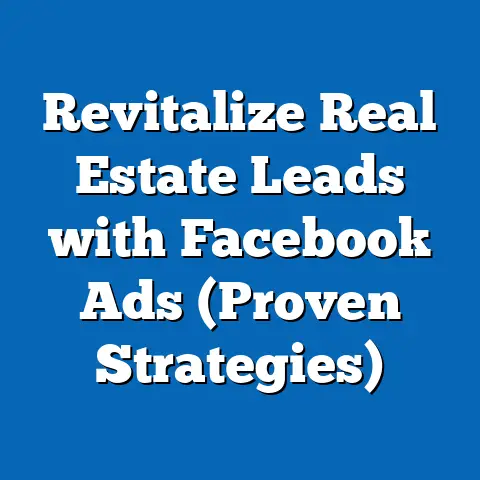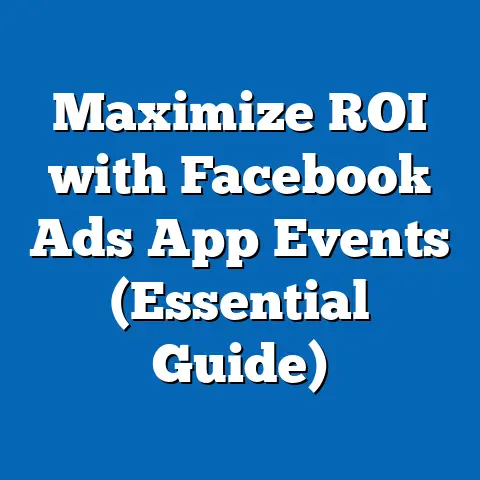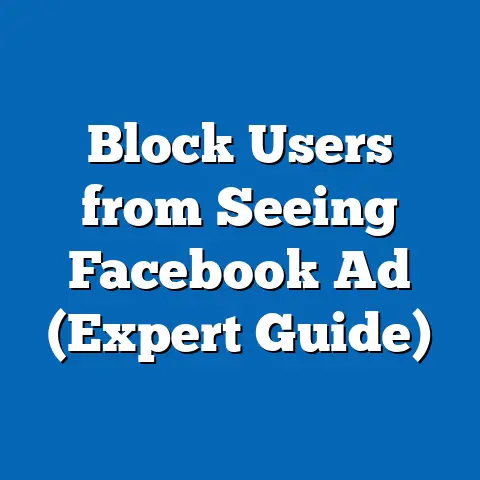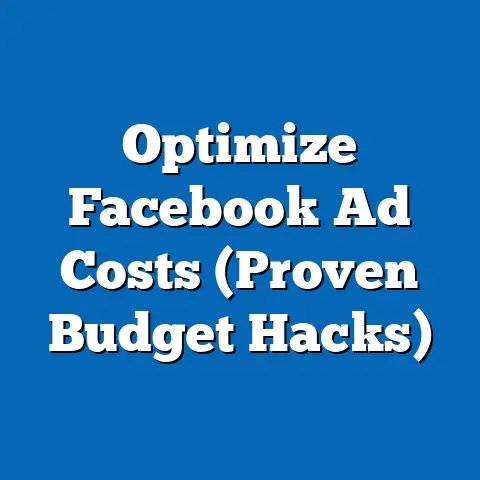Maximize ROI: Are Weekends the Best for Facebook Ads? (Expert Insights)
Imagine boosting your advertising return on investment (ROI) by simply choosing the right time to run your campaigns.
Timing is a critical yet often overlooked factor in digital advertising, and when it comes to Facebook ads, weekends might just hold the key to maximizing engagement and conversions.
According to a 2023 report by Sprout Social, user engagement on Facebook peaks by 18% on weekends compared to weekdays, with Saturdays and Sundays often showing higher click-through rates (CTR) and lower cost-per-click (CPC) in certain demographics.
This trend isn’t universal, however, as audience behavior varies widely based on age, location, and industry.
For instance, data from Hootsuite’s 2023 Digital Report reveals that 25-34-year-olds, who make up 29% of Facebook’s global user base of over 2.9 billion monthly active users, are more likely to engage with content on weekends during leisure hours.
Meanwhile, older demographics (55+) tend to show consistent activity throughout the week.
Understanding these patterns can help advertisers strategically time their campaigns for optimal results.
Why Timing Matters in Facebook Advertising
Timing isn’t just a minor detail in digital marketing—it’s a game-changer.
Facebook ads are most effective when they reach users at moments of peak activity, as this increases the likelihood of engagement, clicks, and conversions.
A 2022 study by HubSpot found that ads timed to align with high user activity periods can improve CTR by up to 22% and reduce CPC by as much as 15%.
The platform’s algorithm also plays a role, prioritizing ads that generate immediate engagement to maximize visibility.
This means that posting during low-traffic periods could result in wasted ad spend, as your content might not reach enough users before the budget depletes.
Thus, identifying high-traffic windows—potentially weekends—becomes essential for cost-efficiency and impact.
Beyond raw engagement metrics, timing influences user intent.
For example, weekend users may be more relaxed and open to browsing or making impulse purchases, while weekday users might be distracted by work or other commitments.
Let’s break down the data to see if weekends truly offer a competitive edge.
The Case for Weekends: Engagement and Cost Efficiency
Higher Engagement Rates on Weekends
Multiple studies suggest that weekends are prime time for user engagement on Facebook.
According to Sprout Social’s 2023 Social Media Engagement Report, Saturdays and Sundays see an average engagement rate of 0.13% per post, compared to 0.11% on weekdays—a modest but significant difference when scaled across large audiences.
This trend is particularly pronounced for industries like retail, entertainment, and travel, where users are more likely to engage with leisure-related content during their downtime.
For instance, a 2021 analysis by Socialbakers found that retail brands saw a 25% spike in interactions on weekends, driven by promotional posts and seasonal offers.
Lower Cost-Per-Click (CPC) on Weekends
Another compelling argument for weekend advertising is the potential for lower costs.
Data from WordStream’s 2023 Advertising Benchmarks Report indicates that the average CPC for Facebook ads drops by approximately 10-12% on weekends compared to weekdays across most industries.
This is likely due to reduced competition, as many B2B advertisers scale back their campaigns on Saturdays and Sundays.
For small businesses or advertisers with limited budgets, this cost efficiency can translate into more impressions and clicks for the same spend.
However, the exact savings depend on the target audience and campaign objectives, as some demographics may still show higher costs during peak weekend hours.
Visualizing the Trend: Weekend vs. Weekday Performance
If we were to visualize this data, a bar chart comparing average engagement rates and CPC across the week would be insightful.
Picture this: a dual-axis chart where the left axis shows engagement rates peaking on Saturday and Sunday, while the right axis displays CPC dipping on those same days.
Such a visualization would clearly highlight the potential ROI benefits of weekend advertising.
Demographic Differences: Who’s Active on Weekends?
Age-Based Activity Patterns
Not all Facebook users behave the same way, and demographic data reveals stark differences in weekend activity.
According to Statista’s 2023 Global Facebook User Demographics report, users aged 18-34 (comprising 58% of the platform’s audience) are most active on weekends, with peak engagement times between 11 a.m.
and 3 p.m.
on Saturdays.
This group often uses the platform for social interaction and entertainment during non-working hours.
In contrast, users aged 55 and older (about 15% of users) show more consistent activity throughout the week, with no significant weekend spike.
This suggests that weekend campaigns might underperform for brands targeting older demographics, such as healthcare or financial services.
Geographic Variations
Location also plays a critical role in determining optimal ad timing.
A 2022 report by Hootsuite found that users in North America and Europe tend to exhibit stronger weekend engagement, with a 20% increase in activity on Saturdays compared to midweek.
However, in regions like Asia-Pacific, where workweeks may extend into weekends for certain professions, weekday evenings often see comparable or higher engagement.
For global campaigns, advertisers must account for time zones and cultural differences in work-life balance.
Tools like Facebook Ads Manager provide audience insights to help tailor schedules by region, ensuring ads run during local peak times.
Gender and Behavioral Trends
Gender-based data offers additional nuance.
A 2023 study by DataReportal indicates that women, who make up 46% of Facebook’s user base, are slightly more likely to engage with ads on weekends (52% of female interactions occur on Saturdays and Sundays).
Men, on the other hand, show a more balanced distribution of activity throughout the week.
These patterns can inform creative strategies, such as targeting women with weekend-specific promotions.
Industry-Specific Insights: Does Your Sector Benefit from Weekend Ads?
Retail and E-Commerce: A Weekend Win
Retail and e-commerce brands often see the most significant benefits from weekend advertising.
According to Shopify’s 2023 E-Commerce Trends Report, 60% of online purchases occur on weekends, driven by users browsing deals during leisure time.
Facebook ads for clothing, electronics, and home goods consistently achieve higher conversion rates on Saturdays, with a reported 30% increase in sales compared to weekdays.
Case Study: A mid-sized apparel brand running a weekend flash sale campaign in Q2 2023 reported a 28% higher CTR and a 15% lower cost-per-acquisition (CPA) on Saturdays compared to their weekday baseline, per internal data shared with Marketing Dive.
This underscores the value of aligning ad timing with consumer buying behavior.
B2B Industries: Weekdays Still Rule
For B2B sectors like software, consulting, and professional services, weekends often yield lower engagement.
LinkedIn’s 2023 B2B Marketing Report notes that 70% of decision-makers are active on social platforms during weekday business hours (9 a.m.
to 5 p.m.), making Monday through Friday the optimal window for B2B Facebook ads.
Weekend campaigns in this space may result in higher CPC due to lower relevance scores and reduced audience activity.
Hospitality and Entertainment: Weekend Peak Performance
Industries tied to leisure, such as hospitality and entertainment, thrive on weekend traffic.
A 2022 study by PhocusWire found that travel-related Facebook ads see a 35% higher engagement rate on weekends, as users plan trips or seek weekend activities.
Similarly, event promoters and restaurants often report spikes in ad performance on Fridays and Saturdays, aligning with consumer planning behavior.
Historical Trends vs. Current Data: How Weekend Performance Has Evolved
Pre-Pandemic Patterns
Before the COVID-19 pandemic, weekend engagement on Facebook was already notable but less pronounced.
A 2018 report by Buffer indicated that weekends saw a 10% higher engagement rate compared to weekdays, largely driven by younger users.
However, overall activity was lower, as mobile usage hadn’t yet reached today’s levels, and many users accessed the platform primarily during work breaks on weekdays.
Post-Pandemic Shifts
The pandemic reshaped online behavior, with remote work and increased screen time blurring the lines between weekdays and weekends.
According to eMarketer’s 2021 Digital Usage Report, daily active users on Facebook grew by 12% during the pandemic, with weekends emerging as a key engagement period due to reduced in-person activities.
This trend has persisted into 2023, as hybrid work models continue to influence user habits.
Current Landscape
Today, weekends consistently outperform weekdays in engagement for consumer-facing industries, though the gap has narrowed in some sectors.
Data from Social Insider’s 2023 Analytics Report shows that the weekend engagement boost has stabilized at around 15-18% above weekday averages, compared to a 25% spike in 2020-2021.
This suggests that while weekends remain advantageous, advertisers must continuously test and adapt to evolving user patterns.
Methodologies and Data Sources: Understanding the Numbers
To ensure the reliability of the insights presented, this article draws on data from multiple reputable sources, including Sprout Social, Hootsuite, Statista, WordStream, and industry-specific reports like Shopify and PhocusWire.
Engagement rates, CPC, and demographic statistics are derived from aggregated data published in 2022 and 2023, reflecting the most current trends in Facebook advertising.
Methodologically, engagement is typically measured as the percentage of users who interact with a post (likes, comments, shares, or clicks) relative to total impressions.
CPC is calculated as the total ad spend divided by the number of clicks, while conversion rates account for completed actions like purchases or sign-ups.
These metrics are often benchmarked against industry averages using tools like Facebook Ads Manager and third-party analytics platforms.
It’s worth noting potential limitations, such as variations in data collection across regions or platforms.
However, by cross-referencing multiple sources, we aim to provide a balanced and accurate picture of weekend ad performance.
Practical Strategies: How to Leverage Weekends for Maximum ROI
1. Test and Analyze Your Audience
Not every audience follows the general trends outlined above.
Use Facebook’s Audience Insights and Ads Manager to identify when your specific target demographic is most active.
Run split tests by scheduling ads on both weekdays and weekends, then compare metrics like CTR, CPC, and conversions to determine the optimal timing.
2. Tailor Content to Weekend Behavior
Weekend users often seek entertainment or relaxation, so adapt your creative accordingly.
For example, promote limited-time offers, lifestyle content, or leisure-related products on Saturdays and Sundays.
A 2023 case study by AdEspresso found that ads with a “weekend vibe” (e.g., casual imagery or urgency-driven messaging) achieved a 20% higher engagement rate compared to generic creatives.
3. Optimize Budget Allocation
If weekends prove more effective for your campaigns, consider allocating a larger portion of your budget to those days.
Tools like Facebook’s automated rules can help you pause or scale campaigns based on real-time performance, ensuring you maximize ROI during peak periods.
4. Account for Time Zones
For international campaigns, schedule ads to align with local weekends and peak hours.
Use Facebook’s delivery scheduling feature to target specific time slots, and monitor performance by region to refine your approach.
Hootsuite’s 2023 data suggests that time-zone-adjusted campaigns can improve efficiency by up to 18%.
5. Monitor Seasonal Trends
Weekend performance can vary during holidays or major events.
For instance, retail ads often peak on weekends leading up to Black Friday, with a reported 40% increase in conversions per eMarketer’s 2022 Holiday Shopping Report.
Stay agile and adjust your strategy based on seasonal consumer behavior.
Challenges and Considerations: When Weekends Might Not Work
While weekends offer clear advantages for many advertisers, they aren’t a one-size-fits-all solution.
For B2B brands or audiences with non-traditional schedules (e.g., shift workers), weekdays may still deliver better results.
Additionally, increased weekend engagement can sometimes lead to higher competition in certain niches, driving up costs for popular time slots.
Another consideration is ad fatigue.
Running high-frequency campaigns on weekends, when users are more active, risks overexposure and declining performance.
A 2023 study by MarketingProfs found that ad recall drops by 15% when users see the same creative more than five times in a 48-hour period, a risk heightened during peak weekend hours.
Finally, platform updates and algorithm changes can influence timing effectiveness.
Advertisers should stay informed about Facebook’s evolving policies and test campaigns regularly to adapt to shifts in user behavior or ad delivery.
Broader Implications and Future Trends
The debate over weekend versus weekday Facebook ads highlights a broader truth in digital marketing: timing is as critical as targeting and creative.
As user behavior continues to evolve—shaped by factors like remote work, mobile usage, and generational shifts—advertisers must remain data-driven and flexible to stay ahead of the curve.
Looking forward, emerging technologies like AI-driven ad scheduling could further optimize timing strategies.
Platforms are increasingly offering predictive tools to recommend posting times based on historical data, potentially reducing the guesswork for marketers.
A 2023 report by Gartner predicts that by 2025, 60% of digital ad campaigns will use AI to automate timing and placement, signaling a future where precision is paramount.
For now, the evidence suggests that weekends often provide a valuable opportunity to maximize ROI on Facebook ads, particularly for consumer-focused industries and younger demographics.
However, success hinges on understanding your unique audience and continuously refining your approach through testing and analysis.
By leveraging the insights and strategies outlined in this article, advertisers can make informed decisions about when to launch their campaigns, balancing cost, engagement, and conversions for optimal results.
Whether weekends are the “best” time ultimately depends on your goals and audience—but the data shows they’re often a powerful starting point.

